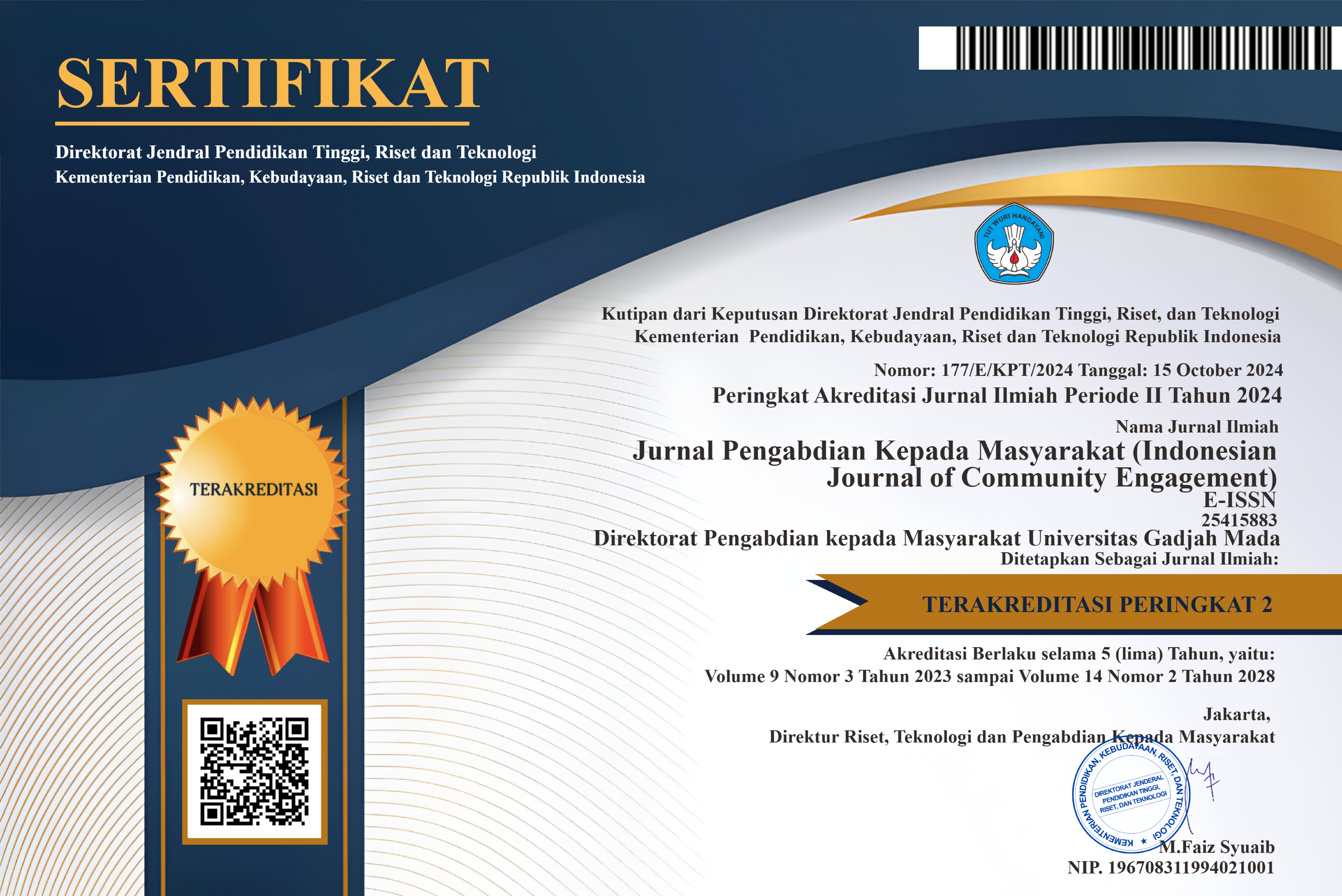Jurnal Pengabdian kepada Masyarakat (Indonesian Journal of Community Engagement), with registered number ISSN 2460-9447 (print), ISSN 2541-5883 (online), also accredited by Sinta with score of S2 from Vol. 9 No. 3 (2023) to Vol. 14 No. 2 (2028), is a scientific multidisciplinary journal published by Directorate of Community Services Universitas Gadjah Mada since 2015. It is a national level journal that covers many familiar problems or issues related to community services. The aim of this journal publication is to disseminate the conceptual thoughts or ideas and research results that have been achieved in the area of community services.
The journal has been currently indexed by both national and international indexer institutions such as the Indonesian Scientific Journal Database (ISJD - National), Indonesian Publication Index (IPI - National), Google Scholar, and Indonesia One Search (National) and several other indexer institutions. Jurnal Pengabdian kepada Masyarakat (Indonesian Journal of Community Engagement) focuses on the main problems in the scientific development of community services areas as follows: Community Services, People, Local Food Security; Training, Marketing, Appropriate Technology, Design; Community Empowerment, Social Access; Student Community Services; Border Region, Less Developed Region; Education for Sustainable Development.
Jurnal Pengabdian kepada Masyarakat (Indonesian Journal of Community Engagement), contains varied activities of the lecturers in handling and managing various potentials, obstacles, challenges, and problems that exist in society. The implementation of service activities also involves the participation of the community and peers. Service activities are organized to improve the welfare of society. JPkM also publishes reviews with certain themes that are decided by the editorial staff.
Jurnal Pengabdian kepada Masyarakat (Indonesian Journal of Community Engagement) made its very first publishing in September 2015 titled Volume 1 No. 1. Since 2016, the journal had been publishing twice a year, in September and March, until 2019. There were some changes made in 2018, where the format such as manuscript template, submission guidelines, and citation guidelines starting from Volume 4 No.1 September 2018, had undergone changes and updates. The period of publishing also changed to three times in a year: April, Augustus, and December for Volume 5 in 2019. The editorial management board and team has been changed 4 times since the first issue in 2015.
In the following year of publication, the journal is going to publish quarterly. Any interested author could submit the manuscript by following the submission guidelines. Please read the guidelines carefully. Authors who want to submit their manuscript to the editorial office of Jurnal Pengabdian kepada Masyarakat (Indonesian Journal of Community Engagement) should obey the writing guidelines. If the manuscript submitted is not appropriate with the guidelines or written in a different format, it will be REJECTED by the editors before further review. The editors will only accept the manuscripts which meet the assigned format.
Every article that goes to the editorial staff will be selected through Desk Review and Initial Manuscript Evaluation processes by the Editorial Board. Then, the articles will be sent to the Mitra Bestari/peer reviewer and will go to the next selection by Double-Blind Peer-Review Process. Further details on reviewing policy and processes are available on submission guidelines.
JPkM’s recent change
As of Volume 6 No. 1 2020, Jurnal Pengabdian kepada Masyarakat (Indonesian Journal of Community Engagement) will publish articles four times a year: March, June, September, and December. As the submitted articles also have been through a careful and well-thorough process in editing and reviewing, this new change has been made to contribute to the improvement of the quality of the journal. Our team made an adjustment by changing the layout from one column to two columns. By 2021 all articles received must be in English.





